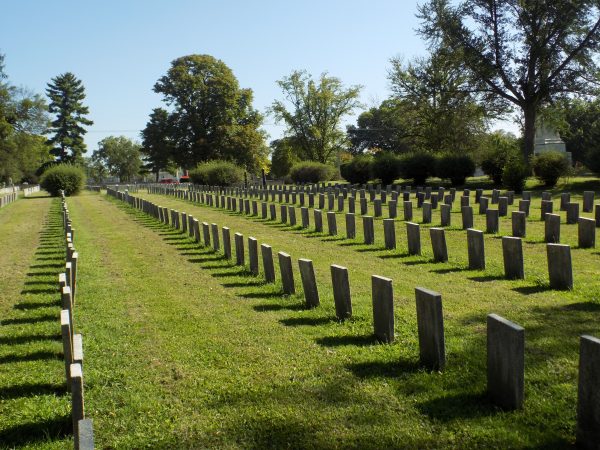ECW Weekender: Winchester’s Cemeteries
Winchester—an important city in the lower Shenandoah Valley—had been a region hub prior to the Civil War. During the conflict, it changed hands over seventy times, and three significant battles took place on the outskirts of town, including Third Winchester, on September 19, 1864.
The war took its toll on the community. Men and boys died in Confederate ranks, sometimes in their own hometown. The women and girls who remained in the town struggled to survive occupations and the resentment that resulted from their experiences. Due to its significant strategic location, the city was spared a major fire or destruction; both sides used Winchester as a hospital town, regularly taking over civic or religious buildings and sometimes private homes.
Sick and injured on Winchester’s battlegrounds or in hospitals died, creating a massive casualty difficulty for the community. Eventually in the post-war era, the Civil War dead buried the Winchester area were moved to two major locations: Winchester National Cemetery or Mount Hebron Cemetery. The National Cemetery honored the fallen Federal soldiers while the Confederates found a final resting place across the street in “Stonewall” Cemetery, a division of the large local cemetery, Mount Hebron Cemetery.
If you are driving through the Shenandoah Valley or spending a day in historic Winchester, consider taking some time to visiting these cemeteries to remember the fallen who fought on the fields surrounding this strategic city.
Winchester National Cemetery
401 National Avenue, Winchester, VA 22601
There are many monuments to explore in the cemetery, including the monument to the 114th New York Infantry which lost more than 60 percent of their strength while stopping Maj. Gen. John Gordon’s counterattack from the Second Woods during the Third Battle of Winchester. Farther on, stands the monument to the 34th Massachusetts Infantry; the bust on the monument is the regiment’s commander, Col. George Well who was killed during a skirmish a few days before the battle of Cedar Creek.
Mt. Hebron Cemetery
305 East Boscawen Street, Winchester, VA 22601
The cemetery is actually four cemeteries surrounded by one enclosure and the oldest section graves date from 1769. In 1844 the charter was granted by the General Assembly of Virginia in response to a petition by the people of Frederick County “to establish a public cemetery.” The Confederate dead are buried in “Stonewall” Cemetery, a portion of the larger graveyard. Here, buried near the cemetery road, rest the graves of Robert Johnston, Archibald Godwin, and George Patton. All three men fought at Third Winchester. Johnston was wounded and Godwin was killed. Patton was mortally wounded during the fight. Following the battle, he was taken to a house in Winchester owned by his cousin, Mary Williams, where he passed away on September 25. Patton was interred in the same grave as his brother, Tazewell, after the war. As a colonel of the 7th Virginia Infantry, Tazewell was killed in Pickett’s Charge at Gettysburg.
The cemetery notes were adapted from Tour Directions published in Daniel T. Davis and Phillip S. Greenwalt’s Bloody Autumn: The Shenandoah Valley Campaign of 1864 (Emerging Civil War Series)



Country Music Legend Patsy Cline is also buried in Winchester.
Daniel Morgan of Revolutionary War fame is buried there as well
The National Cemetery is unique because it is one of the few places where one can see corps badges for the 8th Corps and 19th Corps on various monuments. Also, the monument to 6th Corps division commander David A. Russell killed at Third Winchester is particularly moving.
Rev War General Daniel Morgan is buried in Mount Hebron Cemetery.
“During the conflict, it changed hands over seventy times…” This is remarkable! Is this a record for the war? Might this be a record for any city in any war?
Winchester is a lovely town; we lived there for seven years. The battlefields of Cedar Creek and Kernstown (Stonewall Jackson’s only defeat in the Valley Campaign) are a short drive from these cemeteries. And, Winchester itself is less than two hours’ drive from the metro D.C. area.